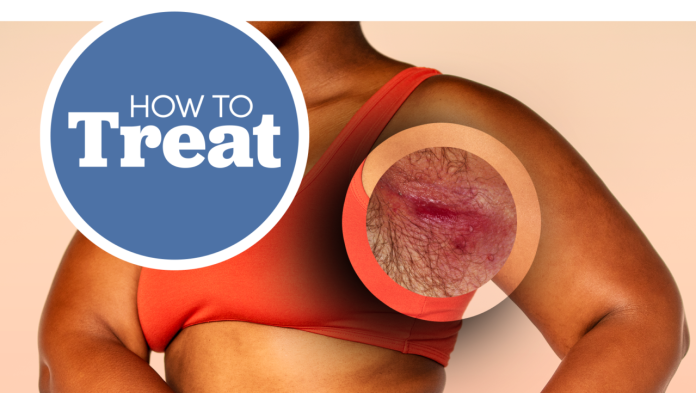Ayurvedic Protocols for Managing Hidradenitis Suppurativa and Crohn’s Disease
Introduction
Hidradenitis Suppurativa (HS) and Crohn’s Disease (CD) are chronic inflammatory conditions that profoundly impact the quality of life. HS primarily presents as painful skin lesions, while CD affects the gastrointestinal tract. Both conditions require a comprehensive and integrative approach to treatment, focusing on addressing underlying causes and alleviating symptoms. Ayurveda offers a holistic framework for managing these conditions by balancing the doshas, detoxifying the body, and promoting overall health and well-being.
Understanding Hidradenitis Suppurativa (HS)
Nature of HS:
- Physical Manifestations: HS manifests as boils, pustules, and painful nodules, primarily in areas with apocrine sweat glands, such as the armpits, groin, and buttocks. Despite its external appearance, HS also has systemic effects.
- Systemic Impact: HS is not just a skin condition; it can affect various body systems and is often associated with multiple comorbidities.
- Autoimmune Component: The condition involves an autoimmune response, where the immune system attacks the body’s tissues, leading to chronic inflammation.
Challenges in Treating HS:
- Chronic Nature: HS is a long-term autoimmune condition with no known cure. However, tailored treatments can manage symptoms and improve the patient’s quality of life.
- Associated Comorbidities: HS is often linked with cardiovascular and metabolic conditions (e.g., type 2 diabetes, hypertension), inflammatory disorders (e.g., Crohn’s disease), hormonal imbalances (e.g., PCOS), and psychological challenges (e.g., depression).
Ayurvedic Treatment for Hidradenitis Suppurativa (HS)
Ayurvedic Perspective:
- Dosha Imbalance: In Ayurveda, HS is primarily attributed to an imbalance of Kapha and Pitta doshas. When the digestive fire (Agni) is weakened, it leads to a slowdown in metabolism and the accumulation of toxins (Ama), resulting in the formation of painful sores.
Holistic Approach:
- Detoxification:
- Importance: Detoxifying the body is crucial in Ayurveda to remove toxins that contribute to HS.
- Methods: Panchakarma, a comprehensive detoxification therapy, including techniques like Vamana (emesis), Virechana (purgation), and Raktamokshana (bloodletting), is used to cleanse the body and restore dosha balance.
- Internal Medications:
- Role: Internal Ayurvedic medications focus on balancing doshas and addressing underlying imbalances.
- Customization: Herbal formulations are tailored to the patient’s constitution (Prakruti) and current imbalances (Vikruti).
- External Applications:
- Purpose: External treatments, including medicated oils, pastes, and poultices, are used to promote wound healing, reduce inflammation, and prevent infections.
- Diet and Lifestyle:
- Diet: A Pitta and Kapha pacifying diet is recommended, avoiding spicy, oily, and heavy foods while emphasizing cooling, bitter, and astringent foods.
- Relevant Shloka: “Pathya ahara vihara sevana” (Charaka Samhita, Sutrasthana 30.26) — “Consumption of a suitable diet and lifestyle.”
Understanding Crohn’s Disease (CD)
Nature of CD:
- Symptoms: CD is characterized by abdominal pain, diarrhea, weight loss, and fatigue, commonly affecting the ileum and colon.
- Pathophysiology: CD involves immune dysregulation, chronic inflammation, and impaired intestinal barrier function.
Ayurvedic Perspective:
- Dosha Imbalance: CD is associated with imbalances in Vata and Pitta doshas, leading to irregular bowel movements, inflammation, and abdominal pain.
Ayurvedic Treatment for Crohn’s Disease (CD)
Holistic Approach:
- Detoxification:
- Methods: Panchakarma, particularly Virechana (purgation) and Basti (medicated enema), is employed to balance Vata and Pitta doshas and cleanse the gastrointestinal tract.
- Internal Medications:
- Role: Internal Ayurvedic treatments focus on balancing the doshas and addressing digestive imbalances.
- Customization: Herbal formulations are personalized according to the patient’s Prakruti and Vikruti.
- Diet and Lifestyle:
- Diet: A diet that pacifies Vata and Pitta is emphasized, avoiding spicy, acidic, and processed foods while incorporating sweet, bitter, and astringent foods.
- Relevant Shloka: “Pathya sevanam vata pitta haram aharam” (Charaka Samhita, Sutrasthana 26.85) — “Consumption of a diet that pacifies Vata and Pitta.”
Integrative Approach to Treatment
Stress Management:
- Techniques: Incorporating practices like yoga, meditation, and pranayama (breathing exercises) helps reduce stress and balance the doshas.
- Relevant Shloka: “Yogah chittavritti nirodhah” (Yoga Sutras of Patanjali 1.2) — “Yoga is the cessation of the fluctuations of the mind.”
Regular Exercise:
- Benefits: Regular physical activity supports digestion, overall health, and mental well-being.
- Specific Practices: Yoga asanas are recommended to balance the doshas and improve both physical and mental health.
Sleep Hygiene:
- Importance: Maintaining a regular sleep schedule and creating a restful environment are crucial for overall health.
- Relevant Shloka: “Samadosha samagnischa samadhatumalakriyah, prasannatmendriyamana swastha iti abhidhiyate” (Sushruta Samhita, Sutrasthana 15.41) — “Health is a balance of doshas, digestive fire, bodily tissues, excretory functions, and a contented mind, senses, and soul.”
Conclusion
Managing Hidradenitis Suppurativa and Crohn’s Disease requires a comprehensive approach that addresses both the symptoms and underlying causes. Ayurveda provides a holistic framework for treatment through dosha balancing, detoxification, and lifestyle modifications. By integrating Ayurvedic principles with modern medical treatments, patients can achieve improved health outcomes and a better quality of life.
For those seeking a personalized Ayurvedic approach to managing HS and CD, EliteAyurveda Specialist Clinic offers tailored treatment plans designed to restore balance and enhance well-being. Visit EliteAyurveda to learn more about our holistic treatments and expert care. Embrace the wisdom of Ayurveda for effective management and long-term relief from chronic inflammatory conditions.
Related-
Know More About Ayurveda Hidradenitis suppurativa Treatment.
GET IN TOUCH


Recent comments